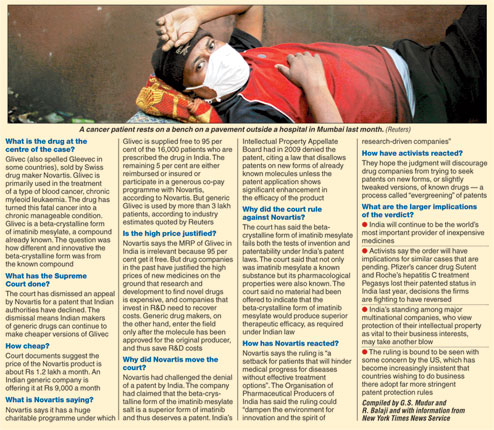 |
New Delhi, April 1: Big Pharma was fuming at the ears and support groups for poor patients were sighing in relief tonight after the Supreme Court dismissed an appeal by Swiss giant Novartis for a patent on a cancer drug.
The immediate impact of the court order is that Indian companies can continue to make generic versions of Glivec, a drug that can make a type of blood cancer non-fatal. (See chart).
Had the Supreme Court upheld the patent application, Novartis would have become the sole producer of the drug for 20 years. Although the company said it was giving the drug free to many patients, its price for a month’s use is about Rs 1.10 lakh more than that of generic copycat versions.
A patent would have meant an estimated 3 lakh-odd patients in India would have had to depend on the company and its pricing policy for the medicine.
The decision sets a benchmark for intellectual property cases in India and does not bode well for foreign firms, including Pfizer Inc and Roche Holding, engaged in ongoing disputes in the country. It also cements the role of local companies as big suppliers of inexpensive generics to India’s rapidly growing $13 billion-a-year drugs market and large parts of the developing world.
The long-term impact of the order is yet to be assessed conclusively. But the immediate reaction of Novartis reflected the dismay sweeping the boardrooms of pharmaceutical multinationals.
Novartis said it had decided not to invest in research and development in India after the verdict and would shift such investments to “favourable destinations”.
The pharmaceutical industry expressed fears that the ruling would “dampen the environment for innovation” and that companies might desist from bringing their newest drugs into the country.
But patients’ groups and activists, savouring the successful completion of a seven-year battle, said the verdict would go a long way in discouraging a tendency among some western companies to seek patents after making minor modifications to existing products. The practice of perpetuating patent rights over products with minor changes is referred to as “evergreening”.
In a 112-page judgment, the Supreme Court bench of Justices Aftab Alam and Ranjana Prakash Desai explained why it was rejecting the Novartis appeal and upholding earlier orders of Madras High Court and the Intellectual Property Appellate Board.
The court said beta-crystalline imatinib mesylate (the generic name of the cancer drug Glivec) was not a new product and was not the outcome of an invention beyond the already-known compound (imatinib mesylate).
 |
The beta-crystalline form of imatinib mesylate does not pass the test of “invention”, the bench concluded after considering various international patent laws, trade and intellectual property agreements and scientific research material.
Section 3(d) of the Indian Patents Act explicitly requires that protection should be granted only to medicines that are new and innovative. For new forms and new uses of existing medicines, the section requires patent applicants to prove significantly improved efficacy.
The court said that the beta-crystalline form of imatinib mesylate was “clearly a new form of a known substance, i.e. imatinib mesylate, of which the efficacy was well known”.
“Now when all the pharmacological properties of the beta-crystalline form of imatinib mesylate are equally possessed by imatinib in free base form or its salt (mesylate), where is the question of the subject product having any enhanced efficacy over the known substance of which it is a new form?” the apex court asked.
The amendments to the Patents Act in 2005 “set up a second tier of qualifying standards” for chemical substances and pharmaceutical products in order to leave the door open for true and genuine inventions but, at the same time, check any attempt at repetitive patenting or extension of the patent term on spurious grounds, said Justice Alam, writing the judgment.
The Union government and patients’ groups opposing the Novartis appeal had said that Indian law must be judged and interpreted on its own terms and not on the basis of standards of patentability prescribed in the West.
One lawyer said the ruling today would raise the bar for patent protection and many drugs that easily won patents in the West would not be able to do so here.
But the verdict did not let the Indian establishment off the hook completely. The court referred to the poor drafting of the amendments to the Patents Act in 2005, its passage in haste and the need for “much greater clarity”.
The shortcoming revives questions about the way complex laws are pushed through in the country without parliamentary debate. The information technology act, whose draconian provision for arrest and harassment had escaped the notice of lawmakers, is another case in point.









